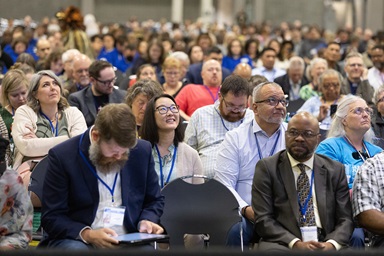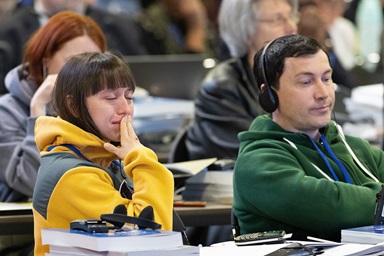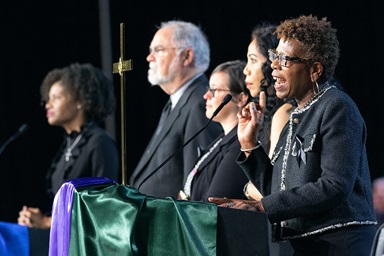Key points:
- Traditionalist voices have been calling for African United Methodists to oppose regionalization proposals and to support extending disaffiliation opportunities to their continent.
- But African United Methodists can decide for themselves on these issues, writes the Rev. Gabriel Banga Mususwa.
- He says Africans don’t need a mediator to facilitate disaffiliation from The United Methodist Church.

Photo courtesy of the author.
Commentaries
It is painful to see how some people keep treating Africans as if they don’t think or reason properly. This is what prophets of doom have been doing to the faithful souls of our continent.
Africans have brains; Africans are educated; Africans are mature enough to think for themselves.
Their quietness doesn’t mean Africans are incompetent or dull. It means they are patient, tolerant and avoid unnecessary tensions and quarreling. It’s unethical in our African culture and traditions for family members to keep scolding each other and fueling conflict. It’s un-Christian and uncalled for.
In 2019, the traditionalists of The United Methodist Church campaigned vigorously to ensure the Traditional Plan prevailed. Soon they were promoting Paragraph 2553 of the Book of Discipline. They encouraged local churches in the U.S. to leave the denomination under that time-limited provision, and in doing so targeted their United Methodist opponents over the issue of LGBTQ inclusion.
Now many of the masterminds of disaffiliation have departed The United Methodist Church, leaving Africans at a crossroads.
During the disaffiliation process, no African intervened, not even bishops, and no Africans were sent or assigned to help mediate. The process was painful to witness, yet our U.S. siblings endured.
Now that Paragraph 2553 has expired, the masterminds have again gone to work, trying to think on behalf of Africans by arguing that the disaffiliation process should extend to Africa. They’ve also been encouraging African United Methodists to oppose the regionalization proposals coming to General Conference.
Do Africans need a mediator? Do we have a problem with The United Methodist Church here in Africa? The answer is no and no.
The Bible in the book of Galatians 5:19-21 talks about works of the flesh, including adultery, sexual immorality, idolatry, sorcery, hatred, strife, jealousies, outbursts of anger, rivalries, divisions. Of late, hatred, strife, jealousies, outburst of anger, rivalries and divisions have been rampant, doing more harm to innocent souls in God’s vineyard in The United Methodist Church.
Christianity must be a conduit of integrity, dignity, morality, honor and reverence for one another. It’s morally incorrect to keep fueling tussling in God’s church. Sponsors of divisions and rivalries, please refrain from testing African patience and integrity.
As believers, we must be sincere and honest when dealing with church matters.
Central conferences were first established in the Methodist Episcopal Church in Asia (India in 1885 and China in 1897), then Europe in 1908 and in Africa and Latin America in the 1920s. However, between the 1930s and 1960s, many annual conferences outside the U.S. became autonomous, particularly most regions of Asia and Latin America.
Today, United Methodist churches and annual conferences outside the U.S. are organized into central conferences, while in the U.S., annual conferences are part of jurisdictions. Therefore, the current regionalization proposals would — in an organizational sense —merely change central conferences into regional conferences. But regionalization would have real benefits, including with General Conference.
If we are honest with each other and faithful to God’s work, we can agree that delegates to General Conference from outside the U.S. often find themselves discussing U.S.-centered issues. It’s rare that African or Filipino issues are discussed. Regionalization would allow for a General Conference that focuses on matters of concern to the whole church, yet traditionalists are working against that idea, suggesting the whole idea is somehow a threat to African United Methodists.
They are doing so when, in fact, we already have a degree of regionalization in place.
Subscribe to our
e-newsletter
Consider that most pastors in Africa — unlike other geographical areas of the church — serve strictly out of love and passion for The United Methodist Church. Most work without a monthly stipend. Even qualifications on ordination vary among jurisdictions and central conferences. All this amounts to a form of regionalization that has been in place for years.
It’s therefore unfair, illogical and dishonest for traditionalists and their allies to label the regionalization proposal going to General Conference as a new style of colonialism and as a conduit for LGBTQ interests. That’s propaganda.
In January, many African delegates to the General Conference met in Dar es Salaam, Tanzania, for the United Methodist Africa Forum. They committed themselves to unity and regionalization, and they also stated that marriage is not just between two adults but between a man and a woman according to our African worldview, traditions, culture and norms.
They emphatically and majestically sang, “We were, we are, we will be United Methodists.”
To fully understand the importance of regionalization, and the degree to which it’s already lived out, one should visit Africa for a while. We are all United Methodist with the same liturgy, but our church services are conducted in a totally different way from those in the U.S. Each region brings to the table its uniqueness. Therefore, regionalization enables believers in different locations not only to worship God in their own languages but also to bring their own cultural traditions in their practice of Christianity and use the resources of theology to speak to the issues around them.
May I conclude with God’s word in the book of Galatians 5:22-23: “But the fruit of the spirit is love, joy, peace, patience, kindness, goodness, gentleness and self-control. Against such things, there is no law.”
May we refrain from politicking, sponsoring divisions, hatred and rivalries. May God’s church be a church of soul winning and healing for the lost and broken in heart and spirit, and not for political rhetoric and hegemony.
Above all, let’s respect each other and respect Africans by acknowledging that Africans have brains, are mature enough to decide for themselves and don’t need a mediator to facilitate disaffiliation from The United Methodist Church. Alone you came and alone you can leave. So spare Africans from such dramas of disaffiliation.
Mususwa is general secretary of the United Methodist Africa Forum.
Like what you're reading? Support the ministry of UM News! Your support ensures the latest denominational news, dynamic stories and informative articles will continue to connect our global community. Make a tax-deductible donation at ResourceUMC.org/GiveUMCom.



